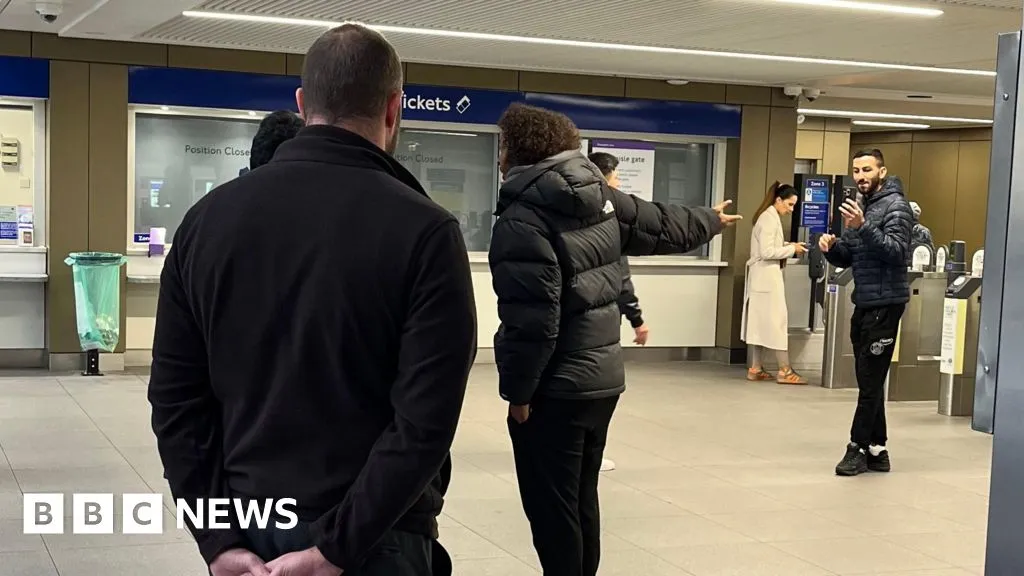The passenger is not happy and starts arguing with the officers. We are in the concourse of Ealing Broadway Elizabeth line station which is a fare evasion hotspot. The Transport for London (TfL) enforcement team has asked him to produce his ticket after the barriers flashed he was travelling on a child fare. He certainly doesn't look like a child.
The argument gets more and more heated with the passenger insisting the barrier machine has taken his ticket and that's why he can't produce it. Rather comically he turns out his pockets. He is trying to charm his way out of the situation.
The laughs slowly stop as it becomes clear he is in trouble.
Suddenly, he bolts straight out of the station. The officers shout at him and try to shepherd him away from the exit but there doesn't seem to be much they can do. They aren't allowed to restrain him or arrest him .They have a hands-off policy and their safety comes first.
Welcome to the world of trying to stop London's fare evaders.
The officers have seen it all. People hurdling the barriers, or even crawling under them. There is a lot of "double gating" where the evader tucks in behind someone else going through the barriers.
These officers are in Ealing Broadway to try and stop fare evasion.
It is a huge problem for TfL, costing it £190m a year. Fare evasion has increased since the opening of the Elizabeth line as more passengers use the TfL network, and many stations on the line don't have staffed barriers.
The loss equates to 3.5% of all fare income. TfL wants to get that down to 1.5% by 2030 although it admits this will be a significant challenge.
Nasir Ahmadi, one of the officers, told BBC London: "One of their main excuses is, 'It's very expensive, we can't afford it.' 'We can't afford it' or 'Transport should be free' or 'I left my Oyster card at home or my bankcard at home', things like that.
"The fact of the matter is everyone is paying their fare and they should be paying for their fare. It's not fair on the general public that they are paying for their fare and you're double gating and pushing your way through."
Another revenue protection officer, Tomi Ogunsuyi, has also heard plenty of excuses: "On a daily basis we usually see people pushing through the barriers. We see them crawling through as well.
"Our aim is to stop the violence and aggression and to support the front-line staff."
"We tend to hear common excuses like, 'I haven't got any money, I didn't know. Why can't travelling be free?' We tend to hear a lot of excuses, to be honest, but we are quite used to it so we explain the reason why everyone should pay for their journey."
Over a three-month period this year, TfL had 9,934 open cases under consideration for prosecution for fare evasion, including both one-off and repeat offenders.
Since April, it has issued more than 30,000 fixed penalty notices, which have recently been increased to £100, and has reported over 9,000 individuals for possible prosecution.
TfL says it is also increasing the number of on-train checks. It says its enforcement teams have completed over 2.8 million checks on board Tubes and trains.
It also uses a combination of data, travel pattern analysis and CCTV to identify persistent evaders.
TfL's head of compliance, Anand Nandha, says they have just employed a team of specialist investigators to focus on persistent offenders.
He won't go into too much detail about how they track offenders down but he's confident they will catch more passengers who don't pay their fare.
"It's not a victimless crime at all," he told me. "We have customers who pay their fare and they will end up having to pay more because we are losing more revenue on the network. So we want to ensure that revenue is used for public services and to help [keep] fares at a low level.
"We have up to 500 revenue inspection officers deployed on the network. We are using different methods of detection.
"We have a team of investigators who we have just employed who will use different methods to go after persistent offenders, like plain-clothes operations on the network.
"We are also looking at technology. We have numerous sources of data to look at patterns of fare evasion and we are also looking at infrastructure on the network to see how else we can reduce fare evasion."
